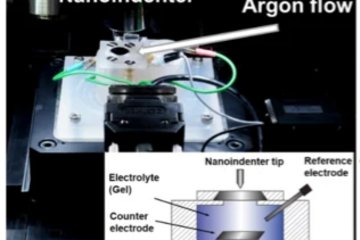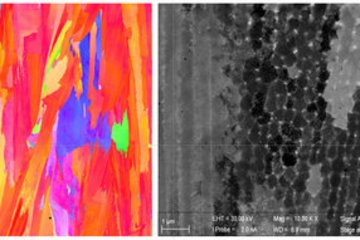All genres
41.
Talk
Using Simulations to Investigate the Apparent Fracture Toughness of Microcantilevers. STKS-ICAMS-Seminar, RUB Bochum, Bochum, Germany (2018)
42.
Talk
Understanding the fracture toughness for brittle and ductile materials at the microscale. Materials Science and Engineering-MSE 2018, Darmstadt, Germany (2018)
43.
Talk
Tribolayer formation during macro- & microscale cyclic contact. MSE Materials Science and Engineering, Darmstadt, Germany (2018)
44.
Talk
Tribolayer formation during macro- & microscale cyclic contact. 45th Leeds-Lyon Symposium on Tribology, Leeds, UK (2018)
45.
Talk
Towards understanding fracture initiation in nanotribology. Materials Science and Engineering 2018 MSE, Darmstadt, Germany (2018)
46.
Talk
Microscale Tribology of Pearlite Steel and the Deformation of Cementite. 10th European Solid Mechanics Conference ESMC 2018, Bologna, Italy (2018)
47.
Talk
Using Simulations to Investigate the Apparent Fracture Toughness of Microcantilevers. STKS-ICAMS-Seminar, Bochum, Germany (2018)
48.
Talk
Severe microscale deformation of pearlitic steel during tribology. DPG Frühjahrstagung, Berlin, Germany (2018)
49.
Talk
New approaches for in-situ nanoindentation of hydrogen charged alloys: insights on bcc FeCr alloys. DPG Spring Meeting of the Condensed Matter Section, Berlin, Germany (2018)
50.
Talk
Composition Dependence of Hardness and Strength of Cubic and Hexagonal NbCo2 Laves Phases. DGM Fachausschuss Intermetallische Phasen (FA‐IP), Max-Planck-Institut für Eisenforschung GmbH, Düsseldorf, Germany (2018)
51.
Talk
Microscale Materials Tribology: Severe Deformation of Pearlite. Talk at Institut für Konstruktionswissenschaften und Technische Logistik, Technische Universität Wien, Wien, Austria (2017)
52.
Talk
Severe Deformation of Pearlite during Microscale Tribology. Talk at Erich Schmid Institute für Materialwissenschaft, Leoben, Austria (2017)
53.
Talk
Using simulations to investigate the apparent fracture toughness of microcantilevers. Nanomechanical Testing in Materials Research and Development VI, Dubrovnik, Croatia (2017)
54.
Talk
Hydrogen Embrittlement on Tungsten using Deuterium Plasma Charging and Microscale Fracture Experiments. GDRi Mecano General Meeting, Toulouse, France (2017)
55.
Talk
In-situ nanoindentation of hydrogen bcc Fe–Cr charged surfaces: Current status and future perspectives. Frontiters in Material Science & Engineering workshop: Hydrogen Interaction in Metals, Max-Planck Institut für Eisenforschung, Düsseldorf, Germany (2017)
56.
Talk
Severe Microscale Deformation of Pearlite and Cementite. 2017 MRS Spring Meeting & Exhibits, Phoenix, AZ, USA (2017)
57.
Talk
Towards understanding fracture experiments at the microscale. DPG Frühjahrstagung 2017, Dresden, Germany (2017)
58.
Talk
Hydrogen Embrittlement on Tungsten using Deuterium Plasma Charging and Microscale Fracture Experiments. DPG-Frühjahrstagung 2017, Dresden, Germany (2017)
59.
Talk
Understanding plasticity in microstructure tribology: experiments and simulations. Friction, Wear and Wear Protection 2017, Ettlingen, Germany (2017)
60.
Talk
The advantages and challenges of microstructure tribology. Materials Science and Engineering 2016 (MSE), Darmstadt, Germany (2016)











